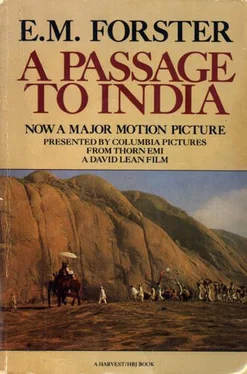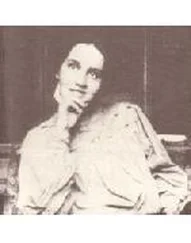The speech dealt at length with the "prisoner's dupes," as they were called—Fielding, the servant Antony, the Nawab Bahadur. This aspect of the case had always seemed dubious to Miss Quested, and she had asked the police not to develop it. But they were playing for a heavy sentence, and wanted to prove that the assault was premeditated. And in order to illustrate the strategy, they produced a plan of the Marabar Hills, showing the route that the party had taken, and the "Tank of the Dagger" where they had camped.
The Magistrate displayed interest in archaeology.
An elevation of a specimen cave was produced; it was lettered "Buddhist Cave."
"Not Buddhist, I think, Jain…"
"In which cave is the offence alleged, the Buddhist or the Jain?" asked Mahmoud Ali, with the air of unmasking a conspiracy.
"All the Marabar caves are Jain."
"Yes, sir; then in which Jain cave?"
"You will have an opportunity of putting such questions later."
Mr. McBryde smiled faintly at their fatuity. Indians invariably collapse over some such point as this. He knew that the defence had some wild hope of establishing an alibi, that they had tried (unsuccessfully) to identify the guide, and that Fielding and Hamidullah had gone out to the Kawa Dol and paced and measured all one moonlit night. "Mr. Lesley says they're Buddhist, and he ought to know if anyone does. But may I call attention to the shape?" And he described what had occurred there. Then he spoke of Miss Derek's arrival, of the scramble down the gully, of the return of the two ladies to Chandrapore, and of the document Miss Quested signed on her arrival, in which mention was made of the field glasses. And then came the culminating evidence: the discovery of the field-glasses on the prisoner. "I have nothing to add at present," he concluded, removing his spectacles. "I will now call my witnesses. The facts will speak for themselves. The prisoner is one of those individuals who have led a double life. I dare say his degeneracy gained upon him gradually. He has been very cunning at concealing, as is usual with the type, and pretending to be a respectable member of society, getting a Government position even. He is now entirely vicious and beyond redemption, I am afraid. He behaved most cruelly, most brutally, to another of his guests, another English lady. In order to get rid of her, and leave him free for his crime, he crushed her into a cave among his servants. However, that is by the way."
But his last words brought on another storm, and suddenly a new name, Mrs. Moore, burst on the court like a whirlwind. Mahmoud Ali had been enraged, his nerves snapped; he shrieked like a maniac, and asked whether his client was charged with murder as well as rape, and who was this second English lady.
"I don't propose to call her."
"You don't because you can't, you have smuggled her out of the country; she is Mrs. Moore, she would have proved his innocence, she was on our side, she was poor Indians' friend."
"You could have called her yourself," cried the Magistrate. " Neither side called her, neither must quote her as evidence."
"She was kept from us until too late—I learn too late—this is English justice, here is your British Raj. Give us back Mrs. Moore for five minutes only, and she will save my friend, she will save the name of his sons; don't rule her out, Mr. Das; take back those words as you yourself are a father; tell me where they have put her; oh, Mrs. Moore…"
"If the point is of any interest, my mother should have reached Aden," said Ronny dryly; he ought not to have intervened, but the onslaught had startled him.
"Imprisoned by you there because she knew the truth." He was almost out of his mind, and could be heard saying above the tumult: "I ruin my career, no matter; we are all to be ruined one by one."
"This is no way to defend your case," counselled the Magistrate.
"I am not defending a case, nor are you trying one. We are both of us slaves."
"Mr. Mahnioud Ali, I have already warned you, and unless you sit down I shall exercise my authority."
"Do so; this trial is a farce, I am going." And he handed his papers to Amritrao and left, calling from the door histrionically yet with intense passion, "Aziz, Aziz—farewell for ever." The tumult increased, the invocation of Mrs. Moore continued, and people who did not know what the syllables meant repeated them like a charm. They became Indianized into Esmiss Esmoor, they were taken up in the street outside. In vain the Magistrate threatened and expelled. Until the magic exhausted itself, he was powerless.
"Unexpected," remarked Mr. Turton.
Ronny furnished the explanation. Before she sailed, his mother had taken to talk about the Marabar in her sleep, especially in the afternoon when servants were on the veraiida, and her disjointed remarks on Aziz had doubtless been sold to Mahmoud Ali for a few annas: that kind of thing never ceases in the East.
"I thought they'd try something of the sort. Ingenious." He looked into their wide-open mouths. "They get just like that over their religion," he added calmly. "Start and can't stop. I'm sorry for your old Das, he's not getting much of a show."
"Mr. Heaslop, how disgraceful dragging in your dear mother," said Miss Derek, bending forward.
"It's just a trick, and they happened to pull it off. Now one sees why they had Mahmoud Ali—just to make a scene on the chance. It is his specialty." But he disliked it more than he showed. It was revolting to hear his mother travestied into Esmiss Esmoor, a Hindu goddess.
"Esmiss Esmoor
Esmiss Esmoor
Esmiss Esmoor
Esmiss Esmoor…."
"Tukaram, Tukaram,
"Ronny—"
"Yes, old girl?"
"Isn't it all queer."
"I'm afraid it's very upsetting for you."
"Not the least. I don't mind it."
"Well, that's good."
She had spoken more naturally and healthily than usual. Bending into the middle of her friends, she said: "Don't worry about me, I'm much better than I was; I don't feel the least faint; I shall be all right, and thank you all, thank you, thank you for your kindness." She had to shout her gratitude, for the chant, Esmiss Esmoor, went on.
Suddenly it stopped. It was as if the prayer had been heard, and the relics exhibited. "I apologize for my colleague," said Mr. Amritrao, rather to everyone's surprise. "He is an intimate friend of our client, and his feelings have carried him away."
"Mr. Mahmoud Ali will have to apologize in person," the Magistrate said.
"Exactly, sir, he must. But we had just learnt that Mrs. Moore had important evidence which she desired to give. She was hurried out of the country by her son before she could give it; and this unhinged Mr. Mahmoud Ali—coming as it does upon an attempt to intimidate our only other European witness, Mr. Fielding. Mr. Mahmoud Ali would have said nothing had not Mrs. Moore been claimed as a witness by the police." He sat down.
"An extraneous element is being introduced into the case," said the Magistrate. " I must repeat that as a witness Mrs. Moore does not exist. Neither you, Mr. Amritrao, nor, Mr. McBryde, you, have any right to surmise what that lady would have said. She is not here, and consequently she can say nothing."
"Well, I withdraw my reference," said the Superintendent wearily. "I would have done so fifteen minutes ago if I had been given the chance. She is not of the least importance to me."
"I have already withdrawn it for the defence." He added with forensic humour: "Perhaps you can persuade the gentlemen outside to withdraw it too," for the refrain in the street continued.
"I am afraid my powers do not extend so far," said Das, smiling.
So peace was restored, and when Adela came to give her evidence the atmosphere was quieter than it had been since the beginning of the trial. Experts were not surprised. There is no stay in your native. He blazes up over a minor point, and has nothing left for the crisis. What be seeks is a grievance, and this he had found in the supposed abduction of an old lady. He would now be less aggrieved when Aziz was deported.
Читать дальше












